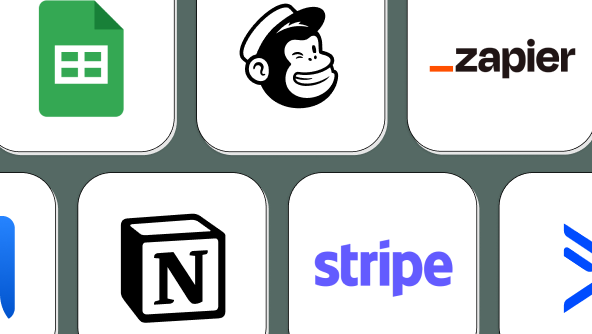
All Solutions

Explore all the solutions you can create with Paperform: surveys, quizzes, tests, payment forms, scheduling forms, and a whole lot more.
See all solutions











Connect with over 2,000 popular apps and software to improve productivity and automate workflows
See all integrationsSolutions
All Solutions

Explore all the solutions you can create with Paperform: surveys, quizzes, tests, payment forms, scheduling forms, and a whole lot more.
See all solutionsIntegrations

Connect with over 2,000 popular apps and software to improve productivity and automate workflows
See all integrationsResources
Stripe vs. Square vs. PayPal: which payment processor is best for your business?

If you're looking for a payment processing provider, there are a range of options to choose from. Three of the most popular providers are Stripe, PayPal, and Square, each offering a similar, but unique, set of features, pricing plans, and experiences.
Paperform allows you to connect to all three providers, giving you the flexibility to choose the one that best suits your business needs. But which tool is that? With so many options it can be overwhelming to try and figure it out—especially for small businesses looking to retain as high a percentage of profit as possible.
That's why we've put together this guide, so you can get a high level view of the strengths and weaknesses of each provider, and make an informed decision for your business.
Summary
- Stripe is a great option for businesses that prioritize simplicity, reliability, and customization, with a focus on online transactions.
- PayPal is well-suited for businesses of all sizes looking for an established provider with a variety of online payment solutions and a strong emphasis on security.
- Square is ideal for businesses that require a user-friendly POS system and a range of features and services tailored to specific industries, such as restaurants and retail stores.
Paperform integrates with all three providers, and takes no extra fees off the top. We think your profits should be exactly that—your profits. You can connect your Stripe, PayPal or Square account to Paperform and start collecting payments in minutes.
Build payment forms that integrate with your favourite payment processor
Start your 14-day free Paperform trial. No credit card needed.
Stripe vs. Square vs. Paypal: At a glance
It’s always good to start with the big picture. Let's take a broad-strokes look at the key features of Stripe, Square and PayPal so you can get a sense of what each tool brings to the table.
| Stripe | Square | PayPal | |
|---|---|---|---|
| Best for | Tech-savvy business owners selling online only who want to create customised payment experiences | Business owners looking to sell both online and in person, especially those in food service | Larger businesses operating in person and online who need to support a wide variety of sales |
| Extra fee for international transactions | Yes | No | Yes |
| Pay with QR code | Yes | Yes | Yes |
| Integrates directly with Paperform | Yes | Yes | Yes |
| 24/7 customer support | Yes | No | No |
| Customisable checkout experience | Yes | No | No |
| Monthly fees | No | Not required, but a paid monthly plan offers additional features for specific businesses | Not required, but a paid monthly plan supports payments from more credit cards |
| POS system | No | Yes | Yes |
| Deposit time | 7-7 days after first transaction, average of 3 business days after that | Payments available next day | Instantly available in PayPal, next day for transfers |
| Direct Integrations with popular apps | Yes | Yes | Yes |
| Customer payment options | Most major credit and debit cards, ACH for US banks only | Most major credit and debit cards, ACH bank transfer | PayPal, Crypto, Most major credit and debit cards, ACH, and Venmo |
Stripe: the internet's go-to payment solution
Stripe bills itself as the “financial infrastructure for the internet.” Suitable for small and large businesses alike, this payment processing tool can be used to accept payments, pay others, create invoices, or manage business finances internally.
It’s a trusted payment gateway for businesses like Amazon, Instacart, Shopify and Slack. While you can use Stripe for in-person transactions, it’s most commonly used for online-only sales.
Stripe’s API is powerful and highly flexible. If you’re not afraid to get your hands dirty with a little code, you can build all kinds of complex solutions, like creating custom back-end integrations for your own app and customising the checkout experience.
There are some no-code, pre-built set-ups to choose from, too. These pre-built options allow you to create a payment link in just a few clicks, process payments in person via terminal, or set up recurring payments. That being said, if you want to get the most out of this powerful tool, it’s best if you have at least a bit of technical knowledge.
Like most payment processors, Stripe uses a per-transaction model for pricing. There is no monthly fee for the business plan. Instead, Stripe takes a set fee and a percentage of each sale to make its profit.
Square: seamless payments in-store and online
Square is another trusted payment processing tool. Unlike Stripe, this one operates more equally in the digital and physical world. Square is a particularly popular option for businesses that sell products both online and in person, like restaurants or retail stores with a brick and mortar location.
Their POS systems are intuitive and robust, and are designed to make processing payments both online and in person as easy as possible.
Square allows customers to pay via credit and debit card as well as ACH bank transfer. The interface is relatively easy to use for buyers and sellers alike.
One of the key perks with Square is how quickly you can transfer your processed payments. You can create a Square checking account to have funds sent directly and immediately to a given bank account, and then transfer those funds quickly and easily to your external accounts.
Square uses a per-transaction pricing model, though they also offer monthly plans tailored to specific industries as well.
PayPal: the tried and true option
PayPal is the oldest payment processing tool on this list. With years of experience developing its services, it's no surprise that they remain a key player in the ecommerce world.
Similar to Square, PayPal supports both in person and online payments. It requires a little less technical prowess to get set up than Stripe, and is a great option for those looking to sell online internationally.
PayPal can process payments through ACH bank transfer, debit and credit cards, and even third party selling platforms like Venmo. While using a card is an option, the most popular way to use PayPal is by connecting it to an account directly, and using it to fund your PayPal account.
Like the other two, PayPal makes its money on a per-transaction model. It takes its cut of the pie by charging a variable fee on every sale you make, rather than having you pay a monthly fee. The pricing model is a little more complex than the other two on the list.
Stripe vs. PayPal vs. Square: Payment processing fees
All three payment gateways use a per-transaction model, but the fees differ slightly platform to platform.
Square is the most competitive for in-person transactions, with a lower fee of 2.6% + 10 cents per transaction. However, Stripe and PayPal both offer competitive online transaction fees of 2.9% + 30 cents per transaction. Stripe also offers volume discounts for businesses that process over $1 million per year, which may be a significant advantage for larger businesses.
Here's a breakdown of the different pricing options and features available for all three platforms:
Stripe
- Stripe Payments: 2.9% + 30 cents per successful transaction
- Stripe Billing: 0.4% per successful transaction, with a cap of $20 per month
- Stripe Connect: 0.5% per transaction, with additional fees for certain features
- Stripe Radar: Starts at $0.02 per charge for risk evaluation and fraud prevention
- Stripe Sigma: Starts at $1,000 per month for custom reporting and analytics
PayPal
- PayPal: 2.9% + 30 cents per successful transaction (additional fees may apply for international transactions, currency conversions, and chargebacks)
- PayPal Payments Pro: $30 per month + 2.9% + 30 cents per transaction
- PayPal Here: 2.7% per card swipe or 3.5% + 15 cents per keyed-in transaction
- PayPal Checkout: No monthly fee, but transaction fees apply (additional fees may apply for certain features and services)
Square
- Square Payments: 2.6% + 10 cents per successful transaction for in-person payments; 2.9% + 30 cents per successful transaction for online payments
- Square Point of Sale: Free for basic features; additional fees for premium features such as payroll and marketing
- Square for Restaurants: 2.6% + 10 cents per successful transaction for in-person payments; 2.9% + 30 cents per successful transaction for online payments, with additional fees for certain features
- Square for Retail: 2.5% + 10 cents per successful transaction for in-person payments; 2.9% + 30 cents per successful transaction for online payments, with additional fees for certain features.
| Payment Processor | In-Person Transactions | Online Transactions |
|---|---|---|
| Stripe | 2.9% + 30 cents per successful transaction | 2.9% + 30 cents per successful transaction |
| PayPal | 2.9% + 30 cents per successful transaction (additional fees may apply for international transactions, currency conversions, and chargebacks) | 2.9% + 30 cents per successful transaction (additional fees may apply for certain features and services) |
| Square | 2.6% + 10 cents per successful transaction | 2.9% + 30 cents per successful transaction |
It's a cliche, but, the best payment processing option will depend on the specific needs and preferences of each individual business.
For businesses that primarily process in-person transactions, Square may be the most cost-effective option. For online businesses, Stripe and PayPal are both good choices, with Stripe offering volume discounts, and PayPal offering a variety of online payment solutions.
Stripe vs. PayPal vs. Square: User experience and customer support
To be completely honest, you can't go wrong with any of these tools when it comes to user experience and support. We've spent hours playing with each tool, and reading customer reviews, and while no tool is perfect, the level of support offered by Stripe, Paypal and Square, is extremely high.
Stripe
- G2 Rating: 4.3/5
- Capterra Rating: 4.7/5
- Developer-friendly platform with a simple integration process
- Extensive documentation and 24/7 customer support team
- Some users report difficulty navigating the dashboard
Paypal
- G2 Rating: 4.4/5
- Capterra Rating: 4.7/5
- Well-established provider with an intuitive interface
- Easy integration process
- Extensive documentation and a community forum
- 24/7 customer support via phone, email, or chat
- Some users report unexpected account freezes and other issues
Square
- G2 Rating: 4.6/5
- Capterra Rating: 4.7/5
- User-friendly POS systems with a simple integration process
- Comprehensive knowledge base and community forum
- 24/7 customer support via phone or email
- Some users report inconsistent customer service experiences and slower response times from support
Stripe vs. PayPal vs. Square: Which tool is right for you?
We're not going to pretend there's a one-size-fits-all solution out of these three products because really, there isn't. Any of them will do the job. But here's our final verdict:
- Stripe is a great option for businesses that prioritize simplicity, reliability, and customization, with a focus on online transactions.
- PayPal is well-suited for businesses of all sizes looking for an established provider with a variety of online payment solutions and a strong emphasis on security.
- Square is ideal for businesses that require a user-friendly POS system and a range of features and services tailored to specific industries, such as restaurants and retail stores.
No matter which provider you choose, Paperform can help collect payments with ease. With support for all three providers, you can choose what's right for you and start accepting payments using Paperforms in minutes.
Whether you're selling products online or collecting payments for a service, we can help streamline the payment process and grow your business. Get started today.
Related reading
- What is branded dropshipping and how do you get started?
- The 10 best Gumroad alternatives in 2023
- The Top Causes of Shopping Cart Abandonment (And How to Combat Them)
- The 11 Best PayPal Alternatives in 2023
- How to set up UTM tracking on your Paperforms
Paperform Contributor
Deepak (Dee) Shukla, the dynamic founder of Pearl Lemon, built the leading SEO agency in London by l...
When Luiz Sifuentes lost the platform powering his entire web design business, he rebuilt smarter—wi...
Julie Winter, a broker licensed in 20 states with over 5,000 homes sold, uses Paperform to automate ...
All of our product updates and big company news for Paperform and Papersign from Oct 24 - May 25 to ...